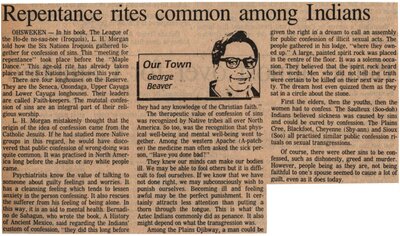"Repentance Rites Common Among Indians"
- Publication
- Brantford Expositor, 1989
- Full Text
- Repentance rites common among Indians
OHSWEKEN - In his book, The League of the Ho-de no-sau-nee (Iroquois), L. H. Morgan told how the Six Nations Iroquois gathered together for confession of sins. This "meeting for repentance" took place before the "Maple Dance." This age-old rite has already taken place at the Six Nations longhouses this year.
There are four longhouses on the Reserve. They are the Seneca, Onondaga, Upper Cayuga and Lower Cayuga longhouses. Their leaders are called Faith-keepers. The mutual confession of sins are an integral part of their religious worship.
L. H. Morgan mistakenly thought that the origin of the idea of confession came from the Catholic Jesuits. If he had studied more Native groups in this regard, he would have discovered that public confession of wrong-doing was quite common. It was practised in North America long before the Jesuits or any white people came.
Psychiatrists know the value of talking to someone about guilty feelings and worries. It has a cleansing feeling which tends to lessen anxiety in the person confessing. It also rescues the sufferer from his feeling of being alone. In this way, it is an aid to mental health. Bernadino de Sahagun, who wrote the book, A History of Ancient Mexico, said regarding the Indians' custom of confession, "they did this long before they had any knowledge of the Christian faith."
The therapeutic value of confession of sins was recognized by Native tribes all over North America. So too, was the recognition that physical well-being and mental well-being went together. Among the western Apache (A-patch-ee) the medicine man often asked the sick person, "Have you done bad?"
They knew our minds can make our bodies ill. We may be able to foot others but it is difficult to fool ourselves. If we know that we have not done right, we may subconsciously wish to punish ourselves. Becoming ill and feeling awful may be the perfect punishment. It certainly attracts less attention that putting a thorn through the tongue. This is what the Aztec Indians commonly did as penance. It also might depend on what the transgression was.
Among the Plains Ojibway, a man could be given the right in a dream to call an assembly for public confession of illicit sexual acts. The people gathered in his lodge, "where they owned up." A large, painted spirit rock was placed in the centre of the floor. It was a solemn occassion. They believed that the spirit rock heard their words. Men who did not tell the truth were certain to be killed on their next war party. The dream host even quizzed them as they sat in a circle about the stone.
First the elders, then the youths, then the women had to confess. The Saulteux (Soo-doh) Indians believed sickness was caused by sins and could be cured by confession. The Plains Cree, Blackfoot, Cheyenne (Shy-ann) and Sioux (Soo) all practised similar public confession rituals on sexual transgressions.
Of course, there were other sins to be confessed, such as dishonesty, greed and murder. However, people being as they are, not being faithful to one's spouse seemed to cause a lot of guilt, even as it does today.
- Mystery Question
- Do you know when this article was published?[Please answer by clicking on the Comments tab]
- Creator
- Beaver, George, Author
- Media Type
- Newspaper
- Item Types
- Articles
- Clippings
- Description
- "In this book, The League of the Ho-de no-sau-nee (Iroquois), L. H. Morgan told how the Six Nations Iroquois gathered together for confession of sins. This "meeting for repentance" took place before the "Maple Dance." this age-old rite has already taken place at the Six Nations longhouses this year."
- Date of Publication
- 1989
- Subject(s)
- Personal Name(s)
- Morgan, L. H. ; Sahagun, Bernadino de.
- Local identifier
- SNPL002511v00d
- Collection
- Scrapbook #1 by Janet Heaslip
- Language of Item
- English
- Geographic Coverage
-
-
Ontario, Canada
Latitude: 43.06681 Longitude: -80.11635
-
- Creative Commons licence
 [more details]
[more details]- Copyright Statement
- Public domain: Copyright has expired according to Canadian law. No restrictions on use.
- Copyright Date
- 1989
- Copyright Holder
- Brantford Expositor
- Contact
- Six Nations Public LibraryEmail:info@snpl.ca
Website:
Agency street/mail address:1679 Chiefswood Rd
PO Box 149
Ohsweken, ON N0A 1M0
519-445-2954



